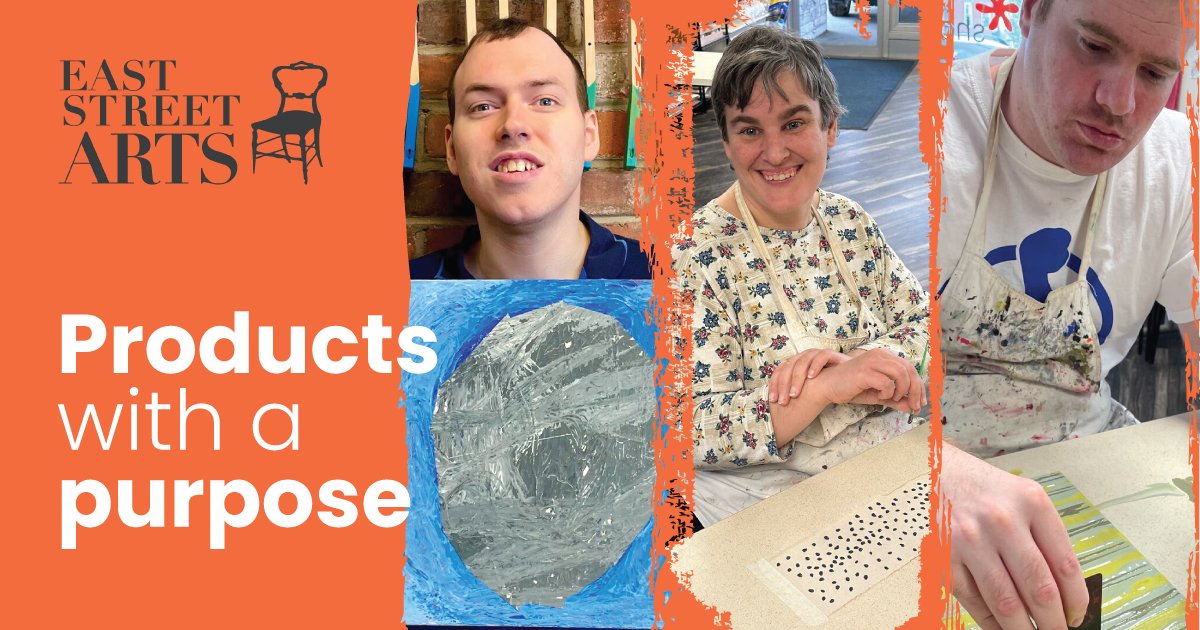A Profile of Allthread Ink Customer East Street Arts
At Allthread Ink, all our customers are important to us. We take the time to get to know our customers and what makes them and the products we print for them special. This month, we want to highlight a customer with a mission we can get behind: East Street Arts.
East Street Arts, based in New Haven, Connecticut, combines training in the arts with opportunities for its clients to earn an income by creating products with a purpose. The program is under the umbrella of an organization called Marrakech Inc., a non-profit that provides housing and services to people with an array of needs, including physical and intellectual disabilities, addiction, and mental illness.
When East Street Arts was established, its focus was on the traditional art of chair caning and seat weaving, which it had taken over from its predecessor organization. While caning is still an important part of the program, East Street Arts has since expanded to other art forms. Each week, more than 30 artists with physical, intellectual, or emotional challenges spend five hours a day, up to five days a week, learning and creating at the workshop.
“We wanted to give our clients a different way to make money besides bagging groceries, so we hired a consultant who did art with people with disabilities and tried various things out,” says Eric Ginnish, Director of Creative Development. “We found that niche that was working well and yes, we want to provide art to people with disabilities, but we wanted to have something marketable. We realized we can’t treat it like just a day program, but also needed to treat it like a business and training program.”
Scaling Up
In 2015, East Street Arts began purchasing blank flour sack towels from Allthread Ink for its artists to block print on, but they were selling out faster than they could make them. They knew they had a popular product on their hands and realized they could increase funding for the program and royalties for the artists by having items screen printed with their designs. This enabled them to increase their sales from 300 flour sack towels in 2017 to 1,400 in 2022. The success of the screen-printed tea towels inspired them to add more printed products.
Today, East Street Arts sells about 2,000 floursack towels, Swedish dish towels, tote bags, and t-shirts designed by its artists and printed by Allthread Ink each year at its onsite and online shops, as well as at craft fairs and nearby retailers. It also sells cards, stickers, magnets, and other printed items, plus handmade woven table runners, painted zipper bags, candles, and other home goods. The artists receive royalties for each printed item they sell, and half the sale price for handmade items.
Purpose Sells
Over time, East Street Arts grew savvy to what products and designs sell best at certain times of the year. They switch up colorways for the season. They also found that towel designs with vegetables, like the radish and carrot designs, sell very well. They also look for opportunities for products specific to where they are being sold.
“I wanted a New Haven green tote bag to sell at the New Haven market. So, we looked at which artist didn’t have something selling right now and chose them to make the bags for that market,” says Eric.
Creativity Abounds
The instructors at East Street Arts get creative with not just the designs they teach clients to create, but with the methods of creating them, tailored to the abilities of the artists.
“One art instructor, Mary, has a good setup where she guides choices in colors and tools for any given day. Like they might be using a credit card, a fork, or a pencil dipped into paint,” says Eric. “For example, there’s one artist who she sets up with a credit card and paint, then moves the canvas around for her. It turns out amazing, and we have used her art for a lot of things. Another artist works with dots.”
The current group of artists ranges from 35 years old to over 80. Most have intellectual disabilities, and there are a few artists with autism or physical disabilities. Many had little experience with art when they joined the workshop, so they started with markers and paper and progressed to other mediums.
“It’s such a lively bunch,” says Eric. “I love to see how much everyone loves to create art. It’s really opened my eyes to realize we can use anyone’s skills no matter what their limitations are.”

